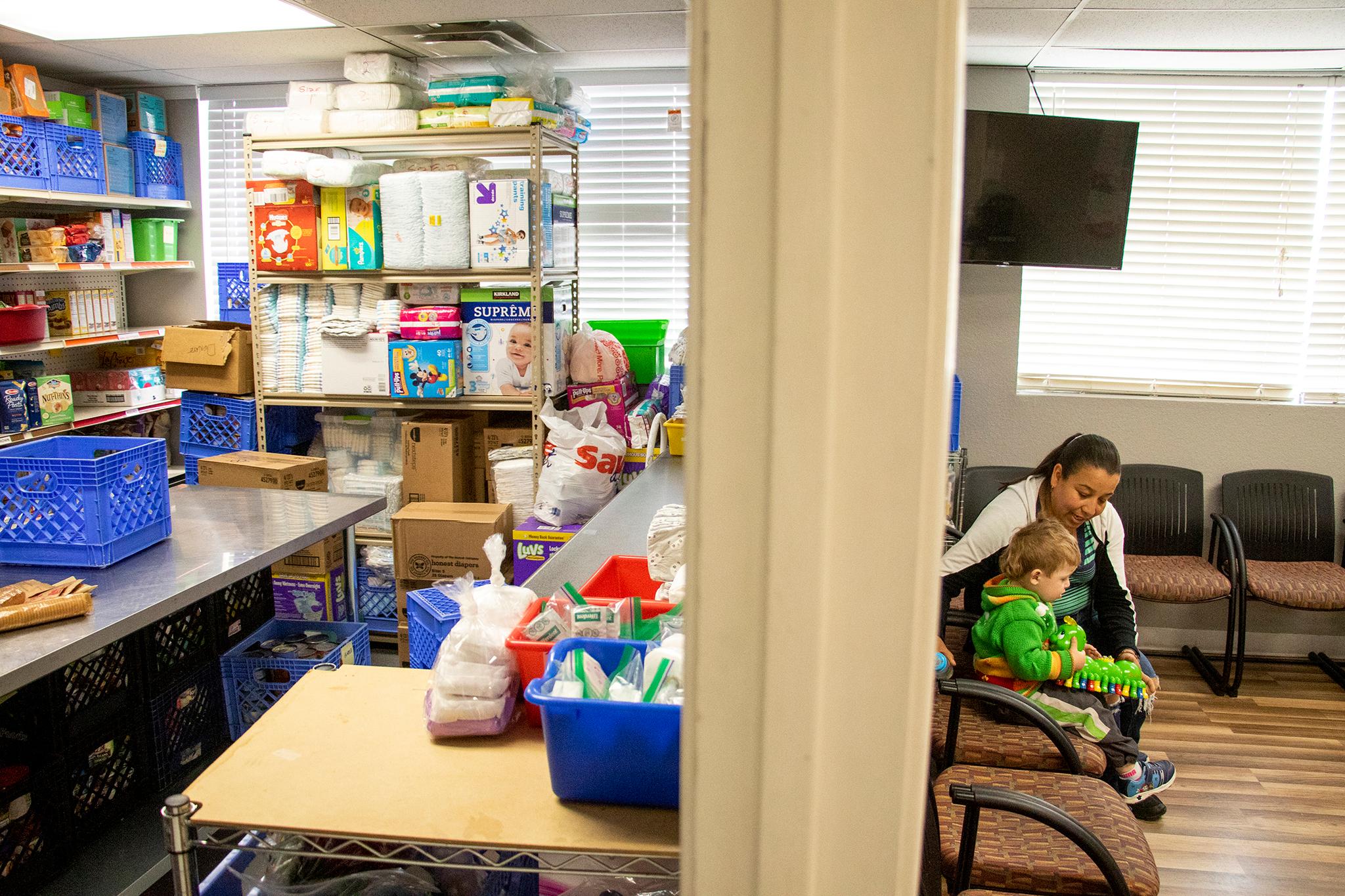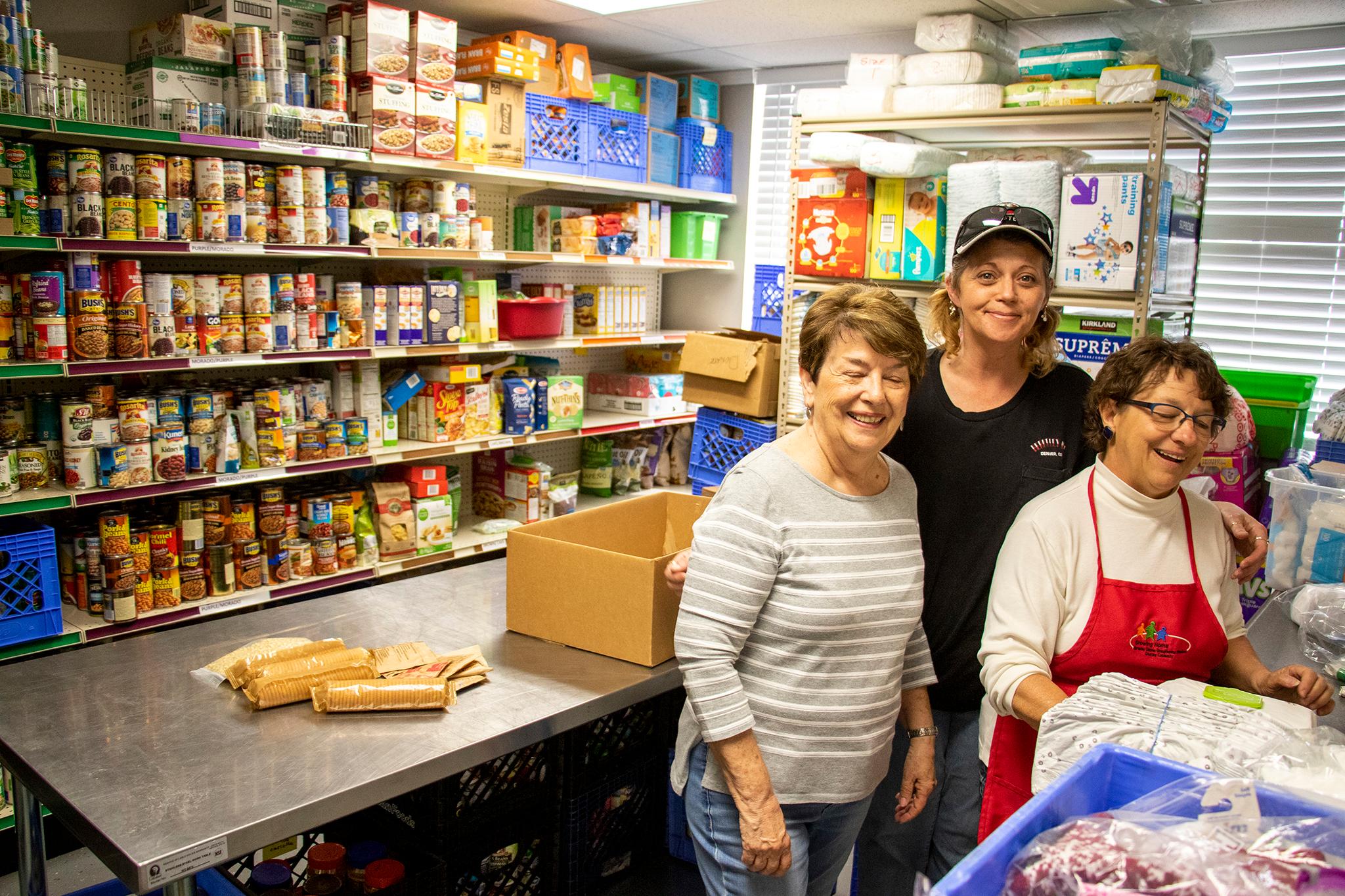Before she started volunteering at a Westminster food pantry, Bev Bishop had only an inkling of the extent of hunger in the suburbs.
"It's been a real eye-opener," Bishop said after a busy morning at the Growing Home pantry.
Growing Home -- which also has housing, parenting and other anti-poverty programs -- renovated its pantry at the start of the year with a $20,000 grant from engine manufacturer Cummins Rocky Mountain. Now the nonprofit can offer free groceries to more families.
Last year, before it got new freezers, refrigerators, shelving and shopping baskets this January, more than 1,300 families picked up canned goods, bread, fresh produce, meats and more at the pantry. That was an increase from about 1,100 families in 2017. Pantry manager Paola Babb is seeing indications that the upward trend will continue.
"We've definitely served more families already this year," she said.


Thirty -nine new families signed up in February. That month 325 families visited the pantry compared to 266 in February of 2018. In March 309 families visited, up more modestly over last March's 296.
Angelica Venegas, who volunteers at the pantry and relies on it to help feed her family, said numbers are increasing in part because need is. She also said word is spreading that Growing Home is better stocked these days.
Growing Home volunteers pick up food that might otherwise go to waste from Bimbo Bakeries, King Soopers, Sprouts, Target and Whole Foods.
Other donations are dropped off by We Don't Waste, a nonprofit that collects food from restaurants, caterers, hotels and wholesalers.
In the past Growing Home has had to turn away offerings "because we didn't have the storage capacity," Babb said.
At the time she had a decrepit freezer she kept around as a shelving unit. Produce was stacked into plastic bins that acted like Petri dishes. Bread was piled on a table. Families didn't want to dig through the pile, so some loaves would go moldy before anyone got to them.
Instead of shopping carts, plastic baskets were used that would get too heavy to carry when they filled up. People collecting food ended up sliding them along with their feet.
"And that was starting to ruin the floor," Babb said.
She toured other pantries, including Metro Caring in Denver, to get ideas for the renovation. She returned with innovations like supermarket-style racks with wire shelving that allows air to circulate around bread and produce.
Kevin Spiller, a mining director at Cummins who also has responsibilities for the multinational's community outreach in North America, said experts from the firm's process improvement team took a look at the Growing Home pantry. They "made some little recommendations about shelving and flooring and storage," he said.
Cummins, which recently moved its Rocky Mountain headquarters to Westminster from Broomfield, supports volunteerism among its employees. The organization even pays them for four hours of giving in their community each year. Cummins employee Lana Templeton was volunteering at Growing Home and introduced others at the company to the nonprofit. Spiller, who lives in Highlands Ranch, had been out to deliver food to the pantry before the renovation and remembers struggling to find room for donations in the freezer. Local staff applied to a Cummins foundation for a grant for the pantry upgrades.
The new pantry is in the same space as the old, at the end of a long hall on the ground floor of a nondescript office building. It looks like a bright, inviting market, but without cash registers. The pantry is open every morning but Sunday. Most days visitors find volunteers have just picked up produce -- lettuce, apples, grapes, avocado, eggplant. Families have to include children under 18 to be able to use the pantry and can pick up a three-day supply of groceries when they come in.
Maria Pizarro, a regular at Growing Home for several years, applauds the renovation.
"It's better. There are more vegetables, fruits," she said.
Items in her shopping bags on Wednesday included everything she needed for a family favorite, quelites. She shared her recipe, which involved chopping and boiling bok choy, sauteing it with onion and serving with pinto beans and "a little bit of salt."
Volunteers like Bishop and Venegas sort through donations to stock the shelves and sweep the unmarred floor. Volunteers also look after toddlers while parents choose items, guided by a list put together by a dietitian that encourages balanced diets.

Bishop heard about Growing Home from a friend who was serving on Westminster's city council. She started volunteering at the pantry about five years ago after retiring. While she said helping out at Growing Home was rewarding, she also said that "we need to be looking community-wide as far as how we can fix the bigger problems."
Growing Home has a larger agenda. Pell Fender, its chief development officer, said the nonprofit is "in the business of addressing poverty in the next generation."
The organization was founded two decades ago by Kathleen Drozda, a nurse at Westminster's St. Anthony North hospital who had befriended a woman she realized was living in her car in the hospital parking lot. At the time, homelessness in Adams County was largely unrecognized, said Karen Fox Elwell, Growing Home's current president and CEO.
Drozda started Growing Home's focus on families. She recruited churches to offer some of their unused space as temporary shelters. Growing Home was then known as the Adams County Interfaith Hospitality Network.
The food pantry and other services followed. Growing Home still offers families temporary shelter in churches, but also owns the Westchester Apartments, providing 20 units of transitional and affordable permanent housing. Growing Home also offers support services, including after school programs, at the Baker School Apartments, an affordable complex that opened in Adams County last year.
Other Growing Home programs include coaching for parents that takes into account the impact of trauma on families; and community organizing in areas such as housing and education.
For many families, the pantry is the introduction to Growing Home.













